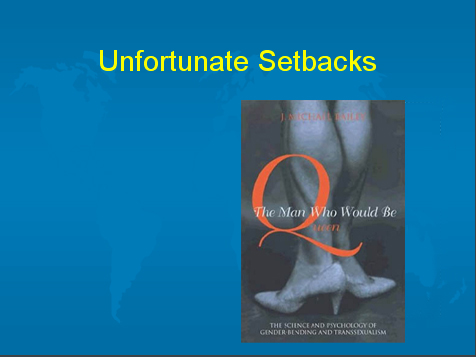Eli Coleman (born August 25, 1948) is an American sexologist who has been involved in issues related to transgender health.
Background
Coleman was born in Buffalo, New York and grew up in Montreal, Canada later moving to Chicago, Illinois.
He earned a bachelor’s degree in psychology and history at Marquette University in Milwaukee, Wisconsin and his master’s in psychology at the University of Wisconsin, Oshkosh. He pursued further graduate work at Miami University in Oxford, Ohio, and completed his Ph.D. in counseling psychology at the University of Minnesota in 1978. He became an instructor and then professor in the University’s Program in Human Sexuality in 1978.
He is the founding editor of International Journal of Transgenderism and International Journal of Sexual Health, and he has served in leadership roles for several professional societies, including as President of HBIGDA (now WPATH). Coleman became director of the Program in Human Sexuality in 1991.
Comments on Bailey (2003)
HBIGDA President blasts Bailey book
Urges assembled experts on transgenderism to “challenge bad science”
Release date: September 13, 2003
Ghent, Belgium — The outgoing President of the Harry Benjamin International Gender Dysphoria Association (HBIGDA) sharply criticized J. Michael Bailey’s recent book as an example of “bad science” about transgenderism.
Dr. Eli Coleman of the University of Minnesota made the remarks during his keynote speech at HBIGDA’s 18th Biennial Symposium in Ghent, Belgium today.
Addressing an audience of the world’s foremost experts on gender identity, Coleman proposed a 10-point blueprint of current and future goals for the organization.
As he outlined the need to “promote sound and ethical research,” Dr. Coleman made a direct reference to The Man Who Would Be Queen by J. Michael Bailey of Northwestern University. The book has been widely denounced as scientifically unsound and deeply biased.
Dr. Coleman urged members to work with the transgender community to “end antipathy and distrust of researchers.” To illustrate what Dr. Coleman called “unfortunate setbacks” to ending this problem, he displayed the Bailey book cover. The book’s provocative title and image of masculine legs and feet in feminine shoes are widely considered to be deliberately insulting. Referring to Bailey’s shoddy scholarship and deeply flawed research methods, Dr. Coleman emphatically declared: “We need to challenge bad science.”

Jamison Green, a writer and educator recently appointed to the group’s Board of Directors, said of Coleman’s speech: “He was urging HBIGDA as an organization and the membership as a whole (as individuals) to become more assertive in addressing social and political issues that affect transpeople.”
Following the speech, HBIGDA’s incoming President Walter Meyer, M.D. vowed to pursue Dr. Coleman’s 10-point plan:
- Promote sexual health including the elimination of barriers to sexual health
- Learn from other cultures
- Let old paradigms die and new paradigms emerge
- Provide access to optimal care
- Provide training to allied health professionals
- Promote sound and ethical research
- End stigma and discrimination
- Change laws and social policies
- Change religious views
- Promote social tolerance for diversity
Dr. Coleman also cited important recent work done by HBIGDA, including expert testimony in a Florida custody case won by a trans father, and the need to fight renewed efforts by the religious groups which still stigmatize transpeople.
In May 2005, Dr. Coleman reiterated his opinion about the Bailey book at the IFGE conference, calling it a “setback.” For more, see Lynn Conway‘s report, linked below.
References
Conway, Lynn (April 30, 2005) Dr. Eli Coleman Rebukes J. Michael Bailey’s Book at IFGE 2005. [link]
Resources
University of Minnesota Medical School (med.umn.edu)
University of Minnesota Libraries (editions.lib.umn.edu)
- Academic Health Center Oral History Project: Eli Coleman (PDF)